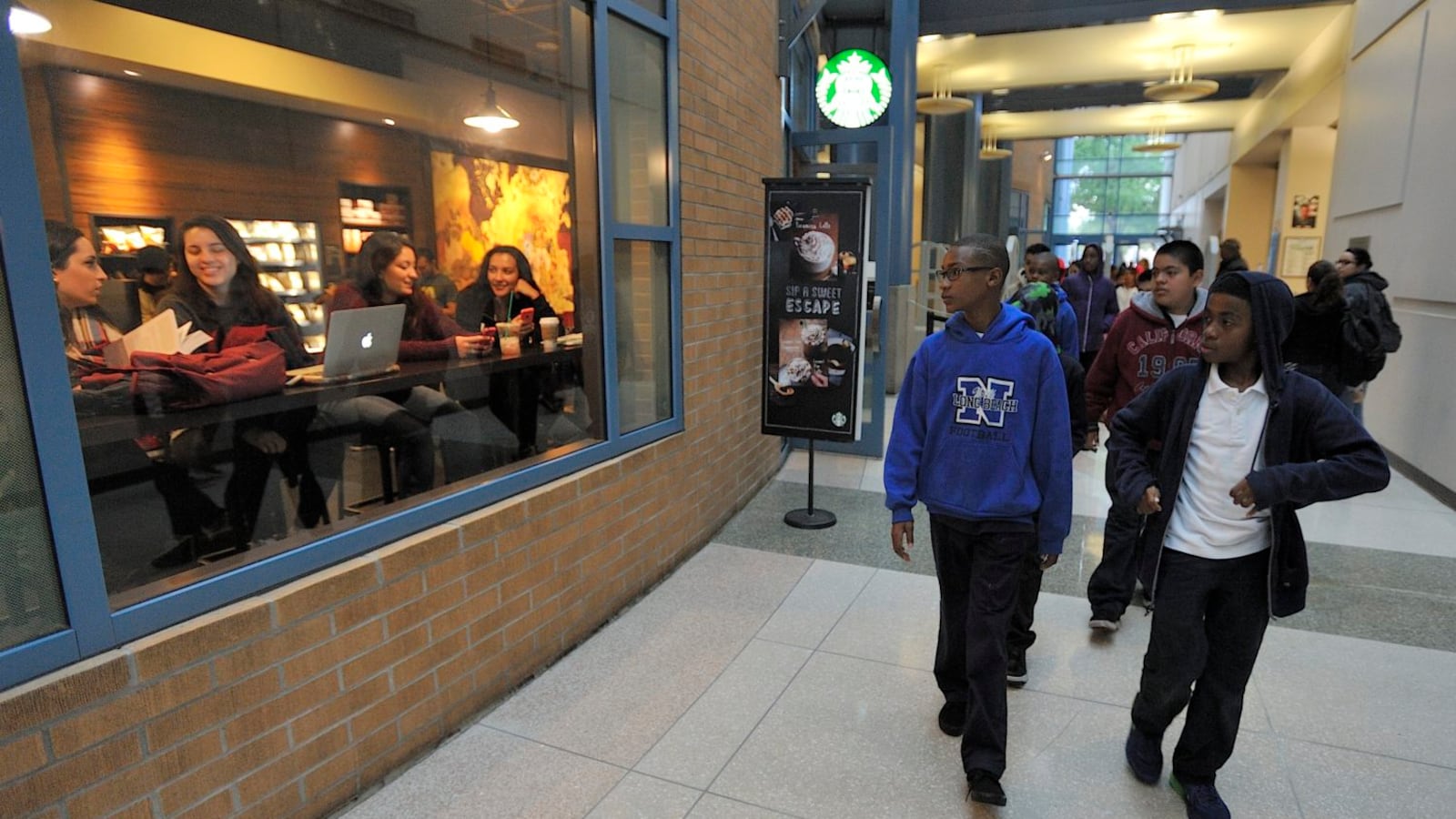When researchers asked hundreds of eighth-graders living near Arkansas’s flagship university whether they’d ever visited a college campus, they were surprised by the response. Only about half said they had.
The team of researchers set out to see whether getting more of those middle-schoolers onto a college quad could affect their decision making about higher education.
“I had seen how visiting campus could potentially make an impact on students’ perceptions on whether or not they could go to college,” said Elise Swanson, one of the researchers and a former high school teacher.
Did it work? Kind of, according to early results released last month.
Spending time on college campuses, the researchers found, slightly improved students’ chances of speaking with school staff about college. It also seemed to increase the rate at which the students took honors or advanced courses in ninth grade.
It didn’t increase the rate that students planned to attend a four-year college, though.
The results amount to promising initial evidence that college visits — a common but rarely studied tactic — are helpful for students, while also highlighting the limits of such an approach to fundamentally change students’ aspirations. New York City, for instance, has created a program to get all middle schoolers to visit a college campus before entering high school.
“It could be that students come to campus, feel more comfortable, are more encouraged, and feel more ready to apply,” Swanson said. “It could also be that students come to campus [and] gain a realistic perspective of the work that it takes to go to college, and start to critically think about whether or not that’s the best fit for them.”
The study, which has not yet been formally peer reviewed, focuses on 15 middle schools and several hundred Arkansas eighth-graders who volunteered to participate last school year. Eighth grade, the researchers figured, could be a sweet spot for altering students’ paths. “They are close enough to high school for the information to resonate, but far enough away from postsecondary matriculation that all options are still open,” as the study put it.
Some of the students were randomly assigned to take three trips to the University of Arkansas over the course of eighth grade; the others got only a packet of information about college opportunities. (The randomization is key because it allows researchers to be confident that any difference between the two groups was due to the college visits.)
The first visit included a campus tour and a seminar about preparing for and succeeding in college. During the second one, students visited various academic departments and learned about different degree paths. The third featured a university baseball game or an on-campus scavenger hunt
Students who went on the tours went on to correctly answer more factual questions about college and to report having more conversations with school staff about college, though the increases were small in both cases.
Those students were also about 6 percentage points more likely to enroll in advanced math, science, or social studies classes in ninth grade. (For statistical reasons, this finding wasn’t definitive.)
On some other measures — students’ engagement in school, whether they had talked to their parents about college — the visits had no clear effect. And students who went on the visits did not report any changes in their plans to attend a four-year university. (For reasons that aren’t clear, campus visits did reduce the likelihood that students planned to attend a technical school.)
The results aren’t surprising to Stephanie Carnahan, the executive director of Oregon GEAR UP, a college prep program that includes campus visits.
She’s seen those trips backfire — when students from a rural community were flummoxed by the turnstile at a university dining hall, for instance. Although they eventually navigated it, some saw it as a symbol of the strangeness of the campus.
“It made them feel awkward and out of place and like they didn’t belong,” Carnahan said.
But she’s also seen real benefits from such trips.
“Our coordinators tell us all the time that they see eighth-graders come back from a college visit and they’re just so excited,” she said. “They never really thought about going to college themselves, but being there and seeing someone who looks like them … has really opened their eyes that it is a possibility.”
The group’s own surveys show upticks in students’ plans to attend college of about 5 percentage points.
One explanation for the lack of effect on the Arkansas students’ college plans is that about two-thirds of the students in both groups already said they planned to go to a four-year college. There may have just been little room for that number to go up.
As preliminary as the study is, it appears to be among the first research specifically on college campus visits. An older study on Upward Bound — an intensive program that aimed to help prepare low-income students for college, including through campus visits — found it had no overall effect on college completion, but did seem help students who started with lower academic aspirations. A recent study of GEAR UP in Iowa found that it boosted college enrollment by 3 to 4 percentage points.
There’s not yet data on how the Arkansas students perform in high school or whether they actually enter and complete college. But the researchers are continuing to study the students, as well as another group of eighth-graders visiting the campus this year.
“We will follow them all the way through high school,” said Gema Zamarro, another of the researchers. “And then eventually we plan to see if they go to college.”


